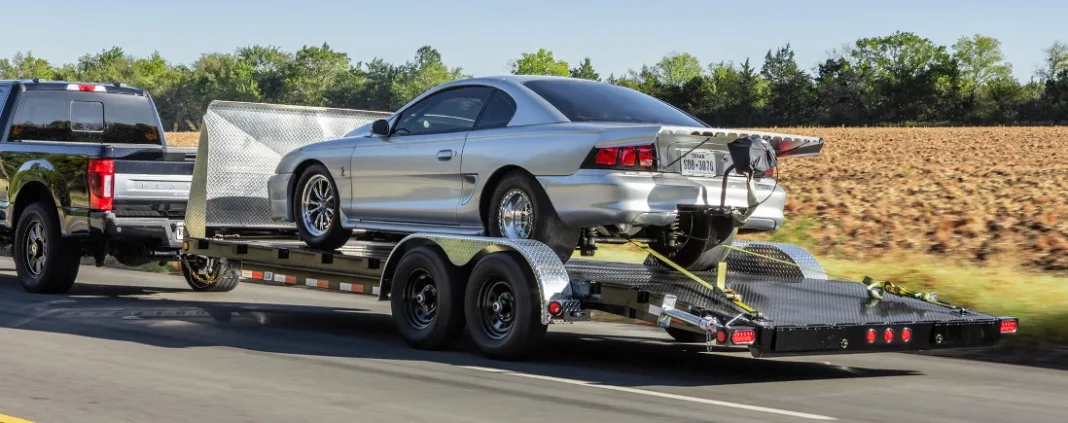Whether you’re a seasoned car enthusiast or someone who occasionally needs to transport vehicles, a trailer for car hauling can be an invaluable tool. These trailers are designed to efficiently transport multiple vehicles, making them an excellent choice for car dealers, collectors, and anyone needing to move cars from one place to another. To make the most of your trailer for car hauling, follow these tips and guidelines.
In certain scenarios, like transporting smaller vehicles or items requiring protection from the elements, adding a 12 foot enclosed trailers to your options can enhance versatility. Enclosed trailers provide an extra layer of security and weather resistance, making them suitable for various transportation needs.
1. Choose the Right Trailer Size
Selecting the appropriate size for your car hauler trailer is essential. Too small, and you’ll struggle to fit the vehicles you need to transport. Too large, and you might end up with wasted space and reduced maneuverability. Consider the types of vehicles you’ll commonly transport and choose a trailer size that accommodates them comfortably.
2. Check Weight Capacities
Before loading up your car hauler trailer, always check its weight capacities. Overloading a trailer can lead to safety hazards and damage to both the trailer and the vehicles you’re transporting. Refer to the manufacturer’s specifications to determine the maximum load the trailer can handle.
3. Properly Distribute the Weight
Maintaining proper weight distribution is crucial for safe and stable towing. Load the vehicles evenly on the trailer to prevent excessive stress on the tires, axles, and suspension. Aim for a balanced distribution to prevent swaying during transit.
4. Secure Vehicles Effectively
Securely fastening the vehicles to the car hauler trailer is of utmost importance. Utilize sturdy tie-down straps or chains to prevent movement during transport. Attach these restraints to the vehicle’s chassis or designated tie-down points to avoid damaging the body or suspension components.
5. Conduct Pre-Trip Inspections
Regular pre-trip inspections help ensure the trailer is in good working condition. Check the tires for proper inflation and any signs of wear. Examine the trailer’s lights, brakes, and safety chains. Address any issues before embarking on your journey.
6. Practice Safe Towing
Towing a car hauler trailer requires careful driving techniques. Increase your following distance to allow for longer stopping distances. Use your side mirrors to monitor the trailer’s position and movement. Be cautious when changing lanes or making turns, considering the trailer’s extended length.
7. Choose Optimal Routes
When planning your routes, opt for roads that are well-maintained and suitable for towing. Avoid narrow streets, sharp turns, and steep inclines whenever possible. Research your route in advance to minimize unexpected challenges.
8. Be Mindful of Weather Conditions
Weather conditions can significantly affect your towing experience. Windy conditions may cause the trailer to sway, while rain can make roads slippery. Keep an eye on weather forecasts and adjust your driving accordingly. If conditions become too hazardous, consider postponing your trip.
9. Secure Loose Items
Before hitting the road, ensure that all loose items within the vehicles are securely stowed. Sudden movements during transit can cause these items to become projectiles, potentially damaging the interior of the vehicles.
10. Maintain Your Trailer
Regular maintenance is key to maximizing the lifespan of your car hauler trailer. Keep the tires properly inflated and check them for signs of wear. Grease the trailer’s bearings as recommended by the manufacturer. Regularly inspect the trailer for rust and corrosion, addressing these issues promptly.
11. Storage Considerations
When not in use, store your car hauler trailer in a safe and dry environment. If possible, keep it covered to protect it from the elements. Regularly check the trailer for signs of deterioration, especially if it’s exposed to harsh weather conditions.
12. Legal Requirements
Be aware of the legal requirements for towing trailers in your area. This may include specific speed limits, licensing, and safety regulations. Adhering to these rules not only keeps you safe but also prevents potential legal issues.
13. Loading and Unloading Tips
Loading and unloading vehicles onto a car hauler trailer requires precision to prevent damage and ensure safety. Use ramps that are appropriate for the vehicles you’re transporting. When loading, drive the vehicles onto the trailer carefully, ensuring they are centered and aligned. To prevent any sudden movement while unloading, make sure the vehicles’ brakes are engaged and the tires are properly chocked.
14. Efficient Space Utilization
Maximize the space on your car hauler trailer by arranging vehicles strategically. Smaller vehicles can be parked between larger ones, optimizing space and ensuring a secure fit. Be cautious not to overcrowd the trailer, as this could lead to difficulties in securely fastening the vehicles.
15. Understanding Trailer Braking Systems
Many car hauler trailers come equipped with braking systems to enhance safety during towing. Familiarize yourself with the type of braking system your trailer has. Some trailers have electric brakes that sync with your towing vehicle’s braking system, while others might require manual braking adjustments. Ensure you understand how to operate and maintain these systems for optimal safety.
16. Towing Vehicle Considerations
The vehicle you use to tow the car hauler trailer is just as important as the trailer itself. Ensure your towing vehicle has the appropriate towing capacity for the loaded trailer. Install any necessary towing equipment, such as a trailer hitch and wiring harness, to establish a reliable connection between the vehicle and trailer.
17. Loading Specialty Vehicles
Transporting specialty vehicles like sports cars, classic cars, or motorcycles requires extra care. Use soft straps or padding to protect delicate paint finishes and sensitive parts. When securing motorcycles, use specialized wheel chocks and straps to prevent movement and ensure stability.
18. Planning for Emergencies
Despite your best efforts, emergencies can still occur while towing. Prepare for unexpected situations by carrying a basic toolkit, spare tire, jack, and emergency supplies. Familiarize yourself with the process of changing a tire on the trailer, as well as troubleshooting common issues that might arise during transit.
Conclusion
Maximizing the use of your car hauler trailer involves a combination of careful planning, proper equipment, and safe driving practices. From loading and unloading vehicles efficiently to understanding trailer braking systems, each aspect plays a role in ensuring successful towing experiences. By implementing the tips and strategies mentioned in this article, you can confidently and safely transport vehicles using your car hauler trailer, making it a valuable tool for your transportation needs.





